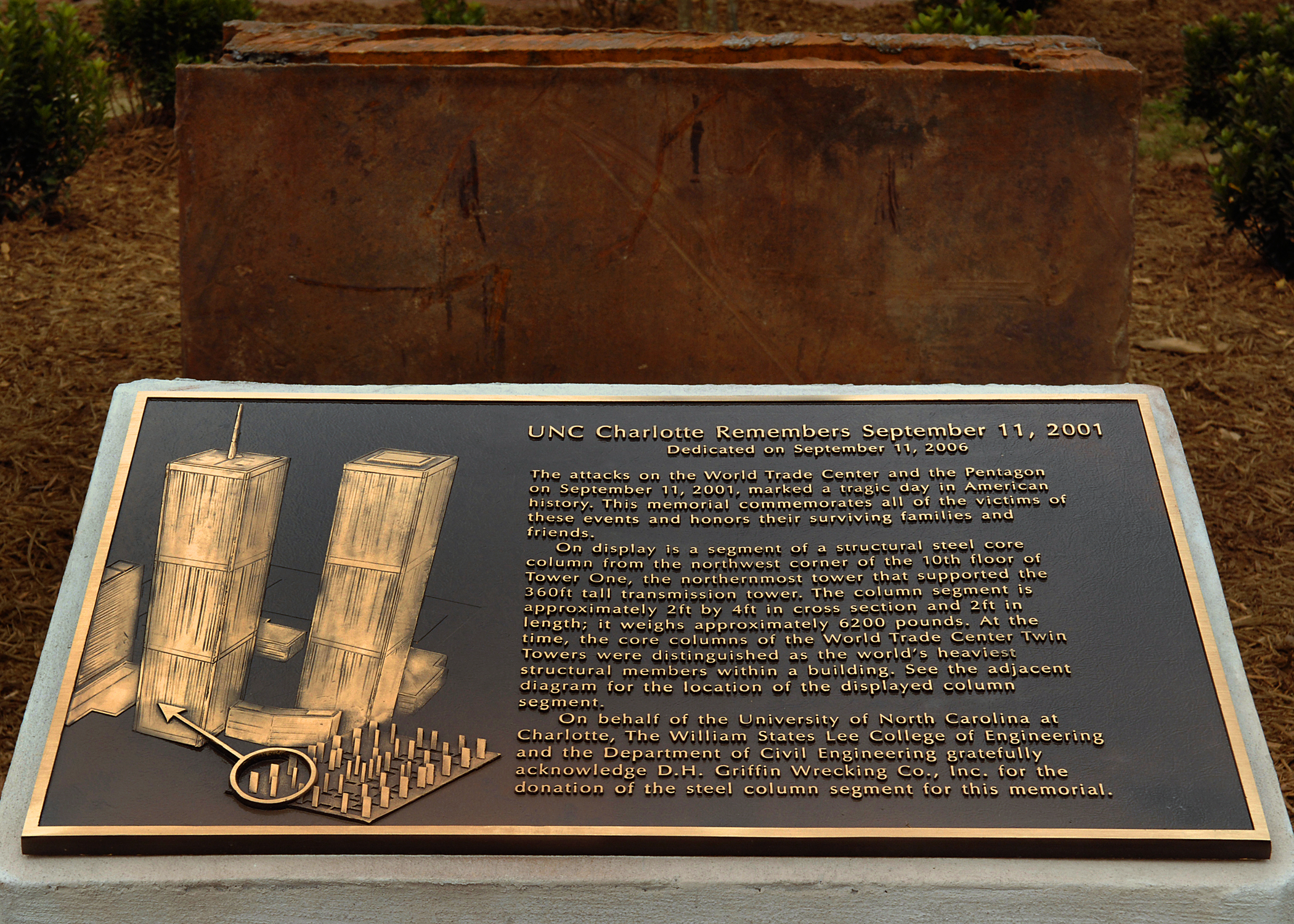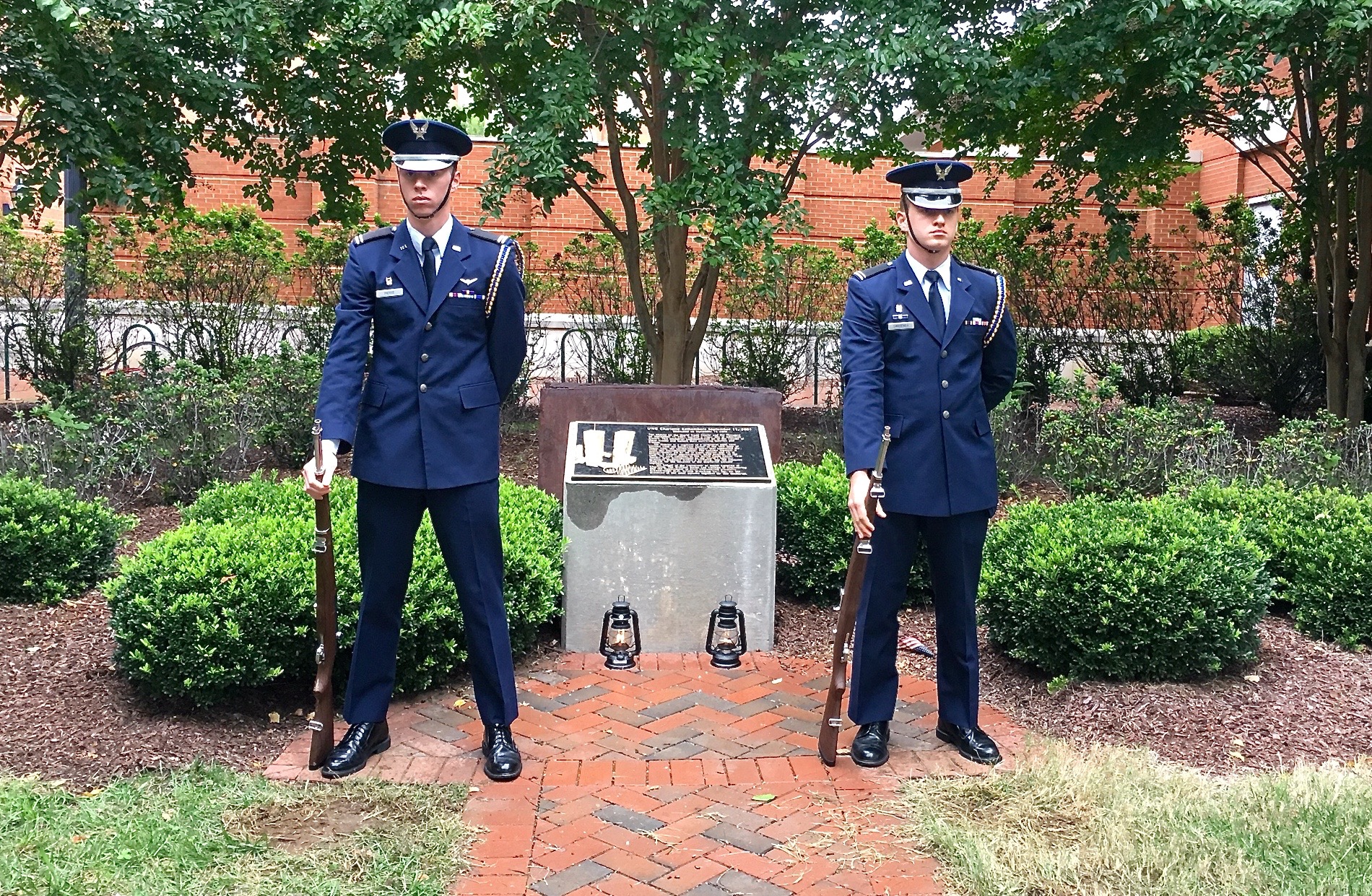In the still early-morning hours of Monday, September 11, 2017, UNC Charlotte Air Force ROTC cadets took up their posts at UNC Charlotte’s 9/11 Memorial.
Starting at midnight, the students took turns over a 24-hour period standing as silent sentinels in memory of those who had lost their lives in the deadliest terrorist attack on U.S. soil, commonly called 9/11. Nearly 3,000 people died 16 years ago on Sept. 11, when planes hijacked by terrorists crashed into the World Trade Center, the Pentagon and a field near Shanksville, Pa.
“The cadets chose a particularly meaningful way to remember the lives lost in the tragic 9/11 attacks,” said Lt Col Richard Sanders, commander of AFROTC Detachment 592 and chair of Aerospace Studies in the College of Liberal Arts & Sciences. “I admire their tenacity and dedication to make a small sacrifice in honor of those who made the ultimate sacrifice that day.”
 The cadets, who are members of the Neil A. Armstrong Squadron with the Arnold Air Society service organization, stood in the rain and wind at the memorial near Duke Centennial Hall, as the vestiges of Hurricane Irma approached. Squadron Commander Noah Swadener, a construction management major, describes the vigil.
The cadets, who are members of the Neil A. Armstrong Squadron with the Arnold Air Society service organization, stood in the rain and wind at the memorial near Duke Centennial Hall, as the vestiges of Hurricane Irma approached. Squadron Commander Noah Swadener, a construction management major, describes the vigil.
We hear that the cadets came up with this idea for a 24-hour vigil on your own. Can you tell us more about how that happened?
Yes, some of the cadets here at AFROTC Detachment 592 are involved with an honorary society named Arnold Air Society. Last semester, when we were discussing our plans for the upcoming fall semester we knew that 9/11 was just around the corner. We had heard of other universities conducting vigils to honor all those that lost their lives in the 9/11 attacks and we wanted to be part of that as well. Our campus does not do much to raise awareness, and we being an honorary society saw that it was our duty to call attention to what happened. So we planned over the summer and then executed when the day rolled around.
What did the vigil entail, from a logistical perspective?
The vigil was tough logistically. We planned for a 24-hour time with 30-minute guard duties with 2 cadets posting guard and 1 cadet being a monitor for when people came up to ask questions. We had 18 people involved and each had their own jobs to do before the day came as far as getting supplies needed, making sure time slots were filled, contacting campus police and anything else that was needed. Once the day came, we had to have at least 3 of our 18 cadets at the memorial on campus at any given time throughout the day.
As the rain began to fall and the temperatures stayed cool, do you have a sense of what thoughts were going through cadets’ minds?
When we began at midnight, there was a light breeze and about 58 degrees. Then once the day continued, the rain started to come, winds started to pick up, and the temperature did not ever really get above 63 degrees. In the early hours of the morning, we were all excited and glad that we could be part of what we were trying to do. Once the weather started to roll in, we were even more motivated to be out there. Being soaked head to toe in our service dress uniform, standing in the wind and in the cold, we felt like we could honor those who gave their lives even more because we were sacrificing our own comforts temporarily for something that they had to do permanently.
Why was it important to you and the other cadets to do this?
This was important for us to do because we wanted to honor those who died and also honor those who are still risking their lives for something that started because of this day. We also think it is our duty as an honorary society to raise awareness to events that happened in our past so that people will not forget.
Was there symbolism in the specific way you did this – what is its meaning?
We were not aiming for any specific symbolism this year because it was our first year doing this. We did not want to try to execute something when we did not know what we were up against. We just wanted to let people know that we need to remember what happened on this day. We also did not want to be “flashy” or attention seeking so that we would take the attention instead of representing the people we were trying to honor.
Did people stop by to join you in the vigil in some way, by sharing a moment of silence or other involvement?
We had a few people come up and ask questions about what we were doing. We even had some people that knew exactly what was going on and they wanted to take a picture. Many people were caught by surprise when they were driving by and saw us standing by the memorial. Even if that is the only time they thought of what that day means, we did our job to remind them.
Now that we know, we want to have people be able to go up to the memorial and place a flower or some kind of honorary object so that they can also be part of actively honoring.
What else would be important to tell people?
The reason why we did it was to raise awareness for what happened on 9/11. We want to make sure people are reverent of the day and remember to support those people who died, lost someone, or were affected in some way.
Words: Noah Swadener, with Lynn Roberson | Images of Vigil: Major Bret Peters; Image of Memorial: Wade Bruton








